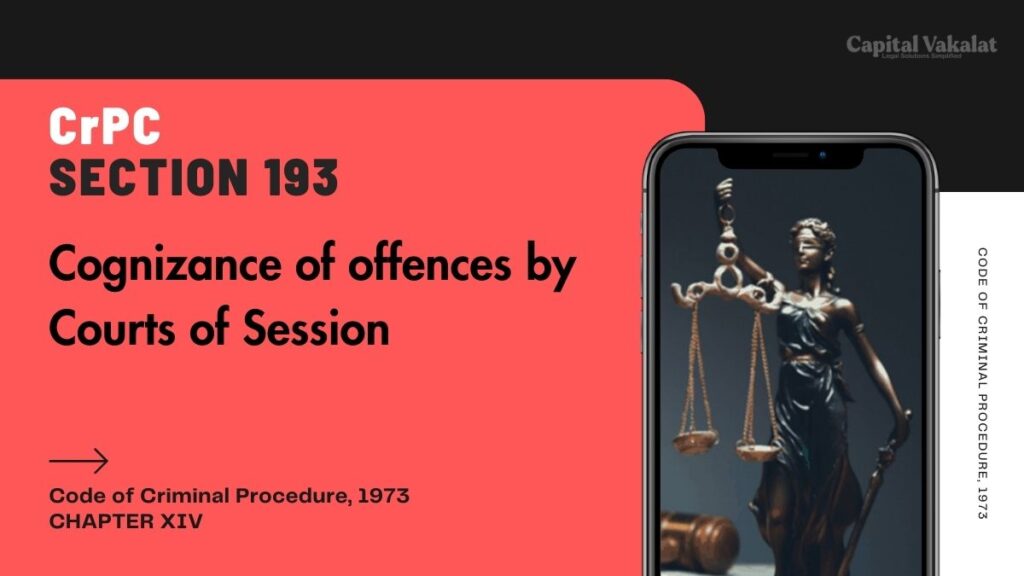The Indian legal framework, with its intricate network of laws, provides a robust structure for maintaining order and justice. Among the myriad provisions, Section 193 of the Code of Criminal Procedure (CrPC) stands out as a pivotal regulation concerning the cognizance of offences by Courts of Session. This article delves into the depths of Section 193 CrPC, elucidating its importance, application, and the procedural dynamics involved.

In the quest for justice, the Indian judiciary operates through various courts, each with its distinct jurisdiction and powers. The Court of Session, a vital tier in this hierarchy, is empowered under Section 193 CrPC to take cognizance of offences. This power, however, is not unfettered and is subject to specific prerequisites and procedural mandates. Understanding these nuances is essential for legal professionals, law students, and anyone interested in the workings of criminal law in India.
Bare Act. Section 193 Cr.P.C.
Cognizance of offences by Courts of Session.
Except as otherwise expressly provided by this Code or by any other law for the time being in force, no Court of Session shall take cognizance of any offence as a Court of original jurisdiction unless the case has been committed to it by a Magistrate under this Code.
Understanding Section 193 CrPC
Legal Provision
Section 193 CrPC states: “Except as otherwise expressly provided by this Code or by any other law for the time being in force, no Court of Session shall take cognizance of any offence as a court of original jurisdiction unless the case has been committed to it by a Magistrate under this Code.”
This provision establishes that a Court of Session cannot directly take cognizance of an offence unless it has been committed to it by a Magistrate. The term “cognizance” here refers to the judicial recognition of an offence, initiating the process of adjudication.
Historical Context
The historical evolution of Section 193 CrPC can be traced back to colonial times, where the need for a structured judicial system was paramount. The provision has undergone several amendments to align with the evolving legal landscape, ensuring that the courts function efficiently and judiciously.
Purpose and Rationale
The primary purpose of Section 193 CrPC is to delineate the procedural boundaries for Courts of Session, ensuring that they handle only those cases that have been duly scrutinized by a Magistrate. This two-tiered approach helps in filtering cases, thereby reducing the burden on higher courts and promoting a more efficient judicial process.
Procedural Aspects of Section 193 CrPC
Role of the Magistrate
The Magistrate plays a crucial role in the framework of Section 193 CrPC. Before a case can reach the Court of Session, the Magistrate must conduct a preliminary inquiry to ascertain the merits of the case. This involves recording evidence, examining witnesses, and ensuring that there is sufficient ground to proceed.
Committal Proceedings
The process by which a Magistrate commits a case to the Court of Session is known as committal proceedings. During these proceedings, the Magistrate evaluates the case’s gravity, the evidence presented, and the necessity of a higher court’s intervention. Only after thorough scrutiny and satisfying the procedural requisites does the Magistrate commit the case to the Court of Session.
Taking Cognizance
Once a case is committed, the Court of Session can take cognizance of the offence. This involves acknowledging the case, scheduling hearings, and embarking on the judicial process to determine guilt or innocence. It marks the formal initiation of the trial phase in the Court of Session.
Implications of Section 193 CrPC
Judicial Efficiency
By mandating that only cases committed by a Magistrate can be taken up by the Court of Session, Section 193 CrPC ensures that the higher judiciary is not overwhelmed with frivolous or unsubstantiated cases. This promotes judicial efficiency and allows the courts to focus on more serious and complex matters.
Legal Safeguards
The provision acts as a legal safeguard, ensuring that accused individuals are not unduly subjected to the rigors of a higher court without sufficient preliminary examination. It upholds the principles of natural justice, providing a fair opportunity for both the prosecution and the defence to present their case at the Magistrate level.
Case Law and Precedents
Several landmark judgments have interpreted and clarified the application of Section 193 CrPC. Courts have consistently emphasized the importance of committal proceedings and the necessity of adhering to procedural mandates to uphold the integrity of the judicial process.
Conclusion
Section 193 CrPC plays a pivotal role in the Indian judicial system by setting clear procedural guidelines for the cognizance of offences by Courts of Session. Its structured approach ensures that cases are meticulously examined at the Magistrate level before reaching the higher judiciary, promoting efficiency and upholding the principles of justice. For legal practitioners and enthusiasts, a thorough understanding of this provision is indispensable, reflecting the complexities and meticulous nature of criminal law in India.